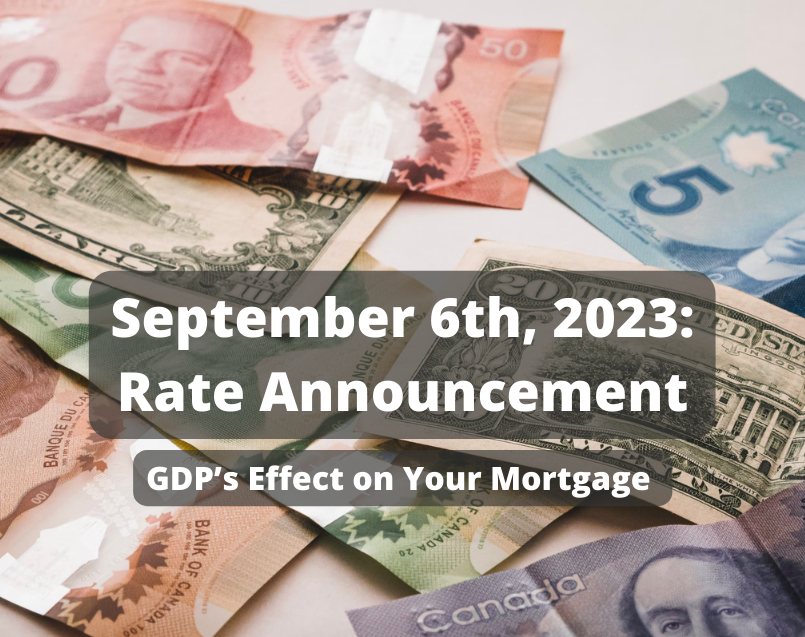Welcome to the Mortgage Professionals Insights Blog, your trusted source for demystifying what goes into the Bank of Canada’s decision-making process when it comes to deciding what to do with interest rates. In this in-depth article, we’ll delve into the latest Bank of Canada interest rate announcement and unravel its implications for homeowners, whether they hold variable or fixed-rate mortgages.
Topics covered in Today’s Blog:
- Today’s rate announcement: September 6th, 2023
- The Bank of Canada’s Decision and Future Hikes
- A weaker Gross Domestic Product (GDP) and its influence on interest rate decisions.
- Jobs Report and Rate Hike Speculations
- Inflation Trends and Core Inflation Canadian
- Canadian Housing Market Updates
- Q2 GDP Growth and Rate Hike Expectations
Today’s Rate Announcement
The Bank of Canada today held its target for the overnight rate at 5%.
In the current economic climate, central banks in advanced economies remain vigilant about inflation while navigating varying growth trends. Although overall inflation has moderated in these economies, core inflation remains elevated, prompting major central banks to prioritize price stability. Global growth experienced a Q2 2023 slowdown, largely due to a significant deceleration in China. The property sector’s weakness has dimmed growth prospects in China, while the United States saw stronger-than-expected growth, driven by robust consumer spending. Europe’s growth was supported by a thriving service sector, offsetting manufacturing contractions. Meanwhile, global bond yields have risen due to higher real interest rates, and international oil prices have exceeded previous assumptions.
In Canada, the economy has entered a phase of weaker growth, essential to ease inflationary pressures. Q2 2023 witnessed a sharp slowdown, marked by a 0.2% output contraction. This downturn resulted from weakened consumption, declining housing activity, and widespread wildfires’ impact. Household credit growth slowed as higher rates constrained spending. While the labour market has gradually eased, wage growth has remained steady at around 4% to 5%.
Despite some easing, recent Consumer Price Index (CPI) data shows persistent inflationary pressures. CPI inflation rebounded to 3.3% in July after briefly dipping to 2.8% in June. Core inflation measures, year-over-year and three-month, are around 3.5%, indicating limited downward momentum. The central bank, noting signs of easing excess demand, has maintained the policy interest rate at 5% while continuing to normalize the balance sheet. They remain prepared to increase the policy interest rate if necessary, closely monitoring inflation dynamics, excess demand, wage growth, and corporate pricing behaviour. Their unwavering commitment is to restore price stability for Canadians.
The Bank of Canada’s Decision and Future Hikes
The recent Bank of Canada decision had been widely expected to hold the rate steady, but what caught everyone’s attention was the intense debate over future interest rate hikes. As we explore this further, we’ll dive into the factors driving this debate and what it means for your mortgage. In an environment where the cost of borrowing can significantly impact your financial well-being. Understanding the nuances of the central bank’s decisions is paramount. We’ll provide insights from financial experts to help you navigate these uncharted waters.
A weaker Gross Domestic Product (GDP) and its influence on interest rate decisions.
Canada’s economic landscape has been marred by weaker GDP growth, a critical factor in the Bank of Canada’s decision-making process. In this section, we’ll take a closer look at the forces driving this weaker GDP performance and why the central bank is inclined to keep rates unchanged for the foreseeable future. Understanding the intricate relationship between GDP and interest rates can empower you to make informed decisions about your mortgage. We’ll break down these economic complexities into digestible insights for the average homeowner.
Forces Behind Weaker GDP Growth
Several factors contribute to Canada’s subdued GDP performance:
- Global Uncertainty: Ongoing global issues, such as trade disputes and geopolitical tensions, have weighed on economic stability, affecting Canada’s growth prospects.
- Commodity Prices: Canada’s reliance on commodities means that fluctuations in energy and raw materials markets can significantly influence economic conditions.
- Consumer Shifts: Changing consumer behaviour, including modified spending habits and remote work preferences, has reshaped demand patterns across industries, affecting GDP growth.
The Bank of Canada’s Approach
Given these challenges, the Bank of Canada has adopted a cautious stance, signalling a preference for maintaining current interest rates. Here’s why:
- Supporting Recovery: Low rates encourage spending, investment, and job creation, essential components of economic recovery following the pandemic.
- Inflation Assessment: Despite rising headline inflation, much of it stems from temporary factors like supply chain disruptions and higher energy prices. Core inflation remains within the target range.
- Global Context: The Bank of Canada acknowledges global economic uncertainty and seeks to avoid overtightening monetary policy, which could hinder growth.
What It Means for Homeowners
Understanding the connection between GDP and interest rates is crucial for homeowners:
- Favorable Mortgage Rates: Anticipate stable or lower mortgage rates in the near future, making it an opportune time for new mortgages or refinancing.
- Financial Planning: The economic backdrop informs long-term financial plans, guiding saving, investment, and debt management decisions.
- Flexibility: Low rates offer homeowners financial flexibility, allowing funds to be allocated elsewhere, such as savings or home improvements.
Navigating economic indicators empowers sound financial decisions. We simplify these complexities, equipping you to navigate the changing economic terrain with confidence. Do not hesitate to contact us today to schedule a consultation.
Jobs Report and Rate Hike Speculations
The jobs report, often regarded as a key economic indicator, plays a pivotal role in shaping rate hike speculations. In this section, we’ll provide an in-depth analysis of the latest jobs report, its implications for interest rates, and how you can adapt your financial strategy accordingly. Our goal is to ensure you have the tools to make sound financial decisions in a dynamic environment
The Impact of a Weaker Jobs Report
When the job market underperforms, it raises questions about the overall health of the economy. It suggests potential challenges in achieving a robust recovery, as employment growth is a key driver of economic vitality. A crucial question emerges: How does a weaker jobs report influence rate hike speculations?
When job growth falters, it indicates that the economy is slowing, and will dampen expectations of imminent rate hikes. The central bank may choose to hold off on tightening monetary policy to provide continued support for employment and economic recovery. Understanding the intricate relationship between employment data and interest rates empowers you to gauge the potential direction of mortgage rates and make informed financial decisions in an uncertain economic climate.
Inflation Trends and Core Inflation
Headline inflation has recently surged, reaching 3.3% due to an increase in housing costs (increased interest rates) and fuel costs (Carbon Tax) but 2% is the ultimate goal. The BOC has a mandate to keep inflation at 2% and they are hell-bent on achieving this goal. They have stated that they will continue to increase rates until they reach this objective. This headline figure is just one part of their decision-making, but it’s essential to look beyond the surface. Core inflation, which excludes volatile items like food, fuel and housing and offers a more accurate picture of the price pressures in the economy.
The Consumer Price Index (CPI) rose 3.3% y/y in July, up from a 2.8% rise in June. The acceleration in headline inflation was widely expected due to a base-year effect on gasoline prices, as a sizable monthly decline in July 2022 (-9.2%) no longer impacts the 12-month movement. Excluding gasoline, the CPI rose 4.1% from 4.0% in June.
The mortgage interest cost index (+30.6%) posted another record year-over-year gain and remained the most significant contributor to headline inflation. The all-items excluding mortgage interest cost index rose 2.4% in July.
Canadian Housing Market Updates
The Canadian housing market statistics have been a hot topic for both homeowners and investors this year. In July, we observed a slight dip in home sales, due to interest rate increases and an overall decrease in new listings. This led to a modest increase in prices due to a lack of inventory and sustained demand.
The decreased number of new listings suggests a lack of supply of homes, which can impact pricing and negotiation dynamics for buyers. On the other hand, prices inching up signal continued demand, but the modest increase indicates that we’re trending toward a more balanced market.
For potential homebuyers, the decrease in housing supply could translate into fewer choices and potentially less favourable pricing negotiations. However, the upward price trend underscores the importance of acting strategically.
For existing homeowners, this market context can help inform decisions about selling or refinancing. Lower interest rates and a balanced market could present opportunities for homeowners to optimize their financial positions.
Q2 GDP Growth and Rate Hike Expectations
The second-quarter GDP growth figures for Canada have been underwhelming, which has many economists predicting that we are finally at the peak of this interest rate cycle. The proof will be in the upcoming GDP, Employment and CPI numbers for August & September before deciding if this is a trend for the upcoming October announcement. As your trusted mortgage professional, we hope to educate and keep you informed about the latest economic trends, their implications for interest rates, and what this means for your mortgage.
Conclusion
In the ever-changing world of interest rates, staying informed is your most potent weapon. At The Mortgage Professionals, we’re committed to empowering homeowners with the knowledge and insights they need to make sound financial decisions. Our team of experts is here to provide personalized mortgage advice tailored to your unique circumstances.
Whether you’re a first-time homebuyer, a seasoned investor, an existing mortgage holder up for renewal or considering refinancing, we’re here to give you the information and guidance necessary to secure your financial future. Your financial journey is unique, and we’re dedicated to helping you make informed choices that align with your financial goals.
From understanding the implications of GDP growth and inflation to deciphering the impact of employment data on rate hikes, we simplify these complexities into actionable insights tailored to your needs.
Navigating the financial terrain can be challenging, but with the right information and guidance, you can chart a course toward a secure and prosperous future. We invite you to connect with us, share your concerns, and let us assist you in achieving your homeownership goals with confidence.
Give your Mortgage Professional a Call Today
Understanding all the recent rate increases can be challenging. It may feel as if finding a solution to your current situation can be difficult. There are many individual factors that will affect your mortgage. If you would like to schedule a consultation, or simply want to give us a call, we are happy to help in any way we can. Even if it’s to provide a little peace of mind during these complicated times.
Contact Darcy Doyle at the Mortgage Professionals today by calling 604-889-7343 or send us an email at darcy@themortgageprofessionals.ca
Click here to visit our Instagram, where we post the latest tips & tricks in the mortgage world.

